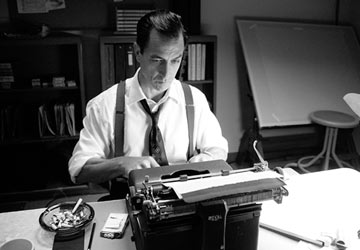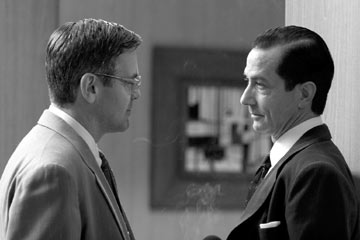

As a director, George Clooney takes a huge step forward with Good Night, and Good Luck, his recounting of CBS newscaster Edward R. Murrow's experiences during the end Senator Joseph McCarthy's Communist witch hunt in the 1950s. His first directorial outing, Confessions of a Dangerous Mind, was all over the place. Good Night, and Good Luck, which takes its name from Murrow's closing statement, is a taut and compelling, shot in crisp black-and-white with a well-rounded cast centered by a magnificent David Strathairn. The movie has a claustrophobic feel, with many scenes taking place in cramped, smoke-filled newsrooms. Clooney, who co-wrote the screenplay with Grant Heslov (Bug, The Scorpion King) even uses archival footage of McCarthy, instead of casting an actor.
Good Night, and Good Luck, opens with Murrow (Strathairn, Twisted, Blue Car) uncomfortable over McCarthy's tactics. He and his producer Fred Friendly (Clooney, Ocean's Twelve, Intolerable Cruelty) decide to do an expose on his show See It Now on McCarthy. An Air Force lieutenant was just kicked out of the service because his father was supposedly a Communist. The problem was that nobody was able to see the actual charges, and there was no trial. Murrow knows full well that he is committing the cardinal sin of a journalist - taking sides, and that it will provoke a serious reaction from McCarthy. He also believes that what he is doing is correct. As expected, McCarthy is not happy. Murrow goes a step further and develops an expose on McCarthy that indicts him using his own words. Again, this riles McCarthy.
Strathairn was not an obvious choice to play Murrow, but after watching his performance, was the right choice. He is the type of actor that can adeptly portray internal emotions. As Murrow, he has to deal with intense pressure from all sides. He has to ensure that all of his facts are accurate, deal with McCarthy, and his own boss William Paley (Frank Langella, House of D, Red Dragon), who holds the keys to Murrow's job. And there is the constant worry that somebody will falsely denounce them as Communists. Clooney's approach is straightforward and simple - like Murrow, he tells the events like they are, using the inherent drama within them rather than relying on other tricks. It is very effective. The one place he stumbles is the inclusion of supporting characters like Robert Downey, Jr. (Eros, Gothika), Patricia Clarkson (Miracle, Dogville), and a few others. Clooney wanted to show the effect of these events on Murrow's co-workers, but they seems like filler.
The sermonizing is also at a minimum, especially for a film as politically charged as this. There are obvious parallels to current events, like the detainment of terrorists at Guantanomo Bay. But to his credit, Clooney, an ardent Democrat, doesn't throw any cheap shots. He sticks to what Murrow and Friendly aspired for - transparency. There is a great scene (in all of the previews) where Friendly confronts a military officer over vague evidence. What he wants is perfectly reasonable - if there is a charge, people should know what it is. If somebody is convicted, it should be with tangible evidence, not hearsay. That sounds perfectly reasonable, and it's amazing that people did not necessarily agree with this only sixty-some years ago.